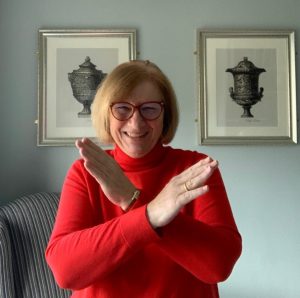International Women’s Day: In conversation with Caroline Siarkiewicz

On International Women’s Day (IWD), I wanted to share with you a blog I wrote for our people.
It’s important for us all to be aware of the challenges women face around gender equality and share experiences so we can drive change and #BreakTheBias.
Why are we marking International Women’s Day?
It feels as though IWD has genuinely grown over the last ten years or so, with more people and organisations marking the day, celebrating women’s achievements, and making efforts to drive change. One of the things I am proud of at MaPS is that we really do seriously engage with the big issues and explore those across the business in our internal work and, importantly, in terms of what we are trying to achieve for the people we serve. It goes back to our mission; we help people – particularly those most in need – to improve their financial wellbeing and build a better, more confident future.
Gender is one of the differences that we need to take into account. One example of this is our work in the pensions space. If we consider the time women, often seen as primary caregivers, spend in the workforce, this impacts their income, pension, and arguably career progression. In Greater London, the value of the average man’s pension pot is 30% higher than the average woman’s. I think it’s crucial that this gender pension gap is considered at the start of women’s working lives so that there aren’t any unintended consequences in retirement.
My female-dominated early life drove my success. I was born into a family of three girls and one boy, so my household was very female-dominated. I went to an all-girls school and have grown up in a space where I never saw my gender as a barrier to my aspirations. In my personal life, I control the money – the bills and financial decisions – I suspect character plays a part in this too! I have one child, a daughter, and one grandchild, my granddaughter, so my adult family life is still female-focused in many ways. Over time, it’s made me even more determined to tackle biases that I began to realise they might face.
I’m delighted to see a seismic shift in flexible working over the past few years allowing everyone, including those with caring responsibilities, a better work/life balance.
When I was a local councillor, if I was going out door-knocking and canvassing, my young daughter would be out with me. If I was at long meetings, she’d be under the table with a colouring book, occasionally popping up to ask, “Isn’t it time to go yet?!” For me, I think there is something in taking steps to make it easier for both men and women to balance their caring responsibilities with their work. I’m delighted to see a seismic shift in flexible working over the past few years allowing everyone, including those with caring responsibilities, a better work/life balance.
How has becoming a grandmother impacted your attitude to money?
Due to travel and meeting-up restrictions during Covid, I didn’t get to see my granddaughter much, which was quite hard. I would send things for her in the post and admittedly, Christmas was a bit of a splurge as they came here for the holidays. One of the gifts I bought her was a money jar so that she could better visualise saving and spending. Because she sees me pay for things in shops with my phone, she tends to reach out with her toy phone too. Our very own Talk, Learn, Do programme stresses the importance of providing practical experiences for children to handle money, so it’s something I plan to do more of, especially now shops have started accepting cash again.
The birth of my granddaughter made me more future-focused on saving in general and saving for her future. I often reflect on what I want the world to be like when she grows up and gets a job, her career. Like any other grandparent, I want to make sure she has the most fulfilled life and can do whatever she sets her mind to.
Have you had to break any biases in your own career?
As I’ve mentioned, in my life I’ve been fortunate that nothing in my work felt impossible. That’s not to say things weren’t hard, especially as my daughter was growing up – navigating childcare and ‘mum guilt’ was definitely a thing. Still, in terms of the barriers, there was only one job where I really felt a ‘shock horror’ moment as a woman in the workplace.
It left me feeling marginalised and like there was a lot of work to be done.
I worked in an organisation where women made up around 2% of the workforce and, for the first time, I experienced a very different world to the one I was used to. I found myself in a culture dependent on networking out of hours, and was often the only woman in the room. It left me feeling marginalised and like there was a lot of work to be done.
What’s one habit you’ve developed as a leader?
Coffee! My days are often filled with back-to-back meetings, so there is something about taking a pause, making a drink, and just having those few minutes to take a breath and keep things in perspective. It’s easy to get bogged down in the day-to-day, but it’s important for me as a leader to keep in touch with the people we serve and focus on why we are all here – we are here to help people. One customer I recently spoke with got his finances in order and retrained as a therapist due to our intervention – he said it changed his life. It’s always right at the forefront of my mind – what more can we do to help people?
Keep up to date with our work at MaPS by registering for our monthly newsletter and joining the conversation on LinkedIn and Twitter.
